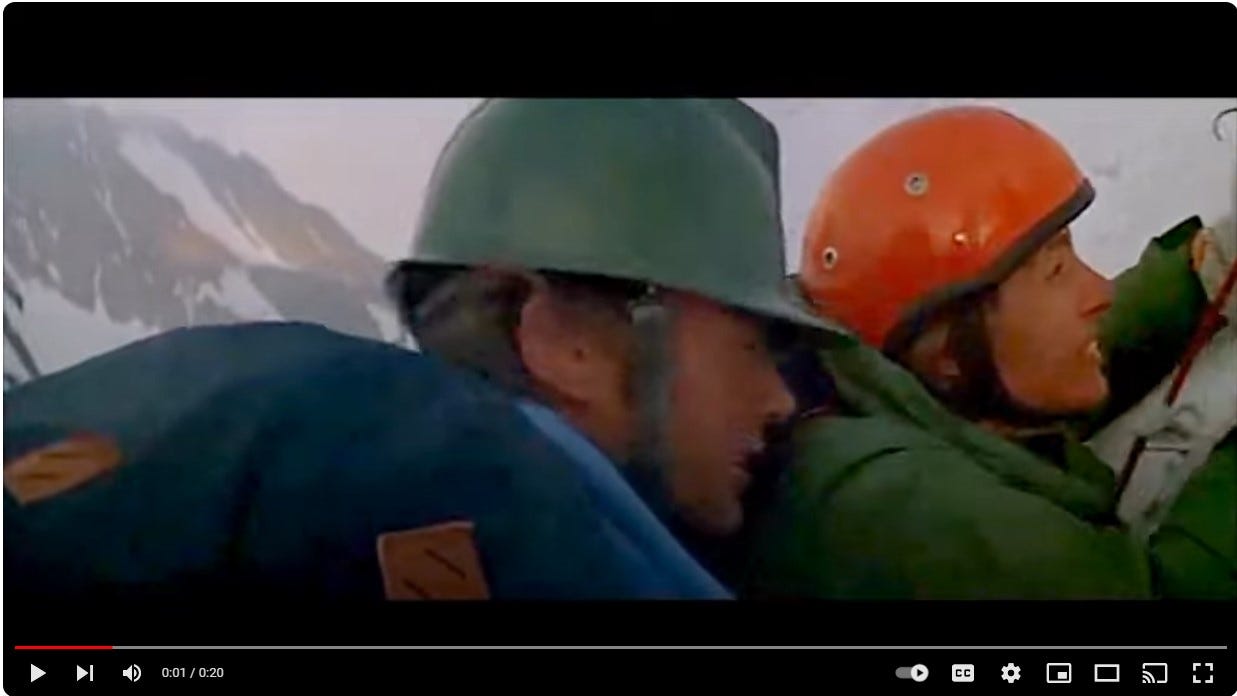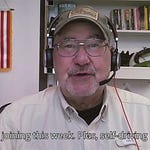Today is Wednesday, January 17, 2024
I would never want to bore you with a story of my sickness. We all know how old people seem to talk of nothing but their infirmities.
This episode, though, is more about faith and kindness than cancer.
Those are sort of drippy concepts for a tough guy like me, but drowning in a pool of despair is a great motivator for clutching at any straw within reach.
If you have missed previous episodes of this saga you may find them here and there.
I was asked again this week: “Now that you have written the book, why are you re-hashing it in these weekly newsletter posts?”
Good question. Maybe I’m just living in the past; maybe the experience was more impactful than I have given it credit. Maybe it’s like the tongue wandering to the broken tooth, perversely exploring the cavity.
But those are not why.
I come back to Alligator Wrestling in the Cancer Ward because the story is about meeting insurmountable problems head-on.
People need to hear the message. And don’t worry: It is neither sappy nor preachy. It is, rather, a realistic approach to facing problems that have no solutions.
I used the alligator wrestling metaphor (over many objections and perplexed frowns) because I can hardly conceive of any activity that is as physical, as terrifying, and as unlikely to succeed as wrestling an alligator.
The great lesson from my experience is: If you lose the attitude war, you lose the war.
Conversely, winning the attitude war makes quality of life immeasurably better. It is better both for the victim and for the caregivers.
Attitude may not help you survive cancer, but, in the words of the French mountain climber in Clint Eastwood’s The Eiger Sanction (1975), “We shall continue with style!”
How My Tough-Guy Attitude Helped Me Survive Cancer, Episode 3 of 4
Kidney Shutdown
In the Cardiac Intensive Care Unit, I slipped in and out of awareness.
Motors whirred and machines beeped. While I could move my head, I could not move it much. It took some time to figure out why my hands would not lift.
Eventually I learned I was intubated. A tube was down my throat. The ventilator.
The hand restraints were to prevent me pulling the tube out.
For a time, I was awake, and knew I was awake. For perhaps long periods I was asleep, or comatose, or at some place in between. According to the impressive hospital billing record (which I saw months later) the total ICU stay was 3 days.
Awake at one point: I had the impression of night time. Two white-coated technicians worked on a temperamental machine beside my bed. It was twice the size of a microwave oven and sat on a cart.
The machine, whatever it was, generated a hugely annoying klaxon sound, clearly a warning, loud enough to alert a nurse outside the room.
The technicians talked with each other, did something to the machine. Another klaxon. One of the techs shrugged and they started in again.
Clearly they were frustrated.
Another klaxon.
I tried mightily to tell them to call the factory service representative, but for some reason I could not speak. This was unsettling and baffling.
In my drugged state, part of my mind told me the technicians probably did not require advice from the patient. Especially not THAT advice.
I learned later about the ventilator; hence the inoperative voice.
When next I was aware, the techs were gone, along with the offensive contraption.
It was a dialysis machine, and it was not working.
Unaware, I floated in a place in the depths of a dark canyon, sometimes awake, sometimes not. The air in this ICU was permeated with a disquieting notion of fear. Unable to speak, move my head or hands, I simply endured.
And thought about the fear.
And waited for what would happen next.
Am I awake or am I sleeping?
***
Let me backtrack 3 weeks.
After the first 10 days of my hospital stay, deep into the first “induction” session of chemotherapy, I was worn down, dispirited and ravaged by the chemo drugs.
Into this depressing existence, a month-old mouth sore asserted itself.
Mouth sores are common among cancer patients.
A blemish on the side of my tongue flared up. It was continuously painful. The simple act of routine swallowing was an effort of the will, knowing it would spark a new stab of pain.
For meal times, the nurse and I had worked out a plan. Two hours before the meal she administered oxycodone; an hour before, she administered Tylenol. When dinner arrived I swabbed the mouth and tongue with Lidocaine to deaden the nerves.
With this regimen, I could choke down a few bites, still with considerable effort.
Into this daily ordeal came Marva.
She was very tall and very black, wearing the charcoal scrubs showing that she was a housekeeper, an “environmental technician.” Marva had a larger-than-life personality, at once both dominating and humble. She sucked up all the oxygen in the room.
“Are you Mister Curt?” her voice boomed as the door opened. She surveyed the room, as though assessing how we had mistreated this patch of her kingdom. Then, “Mister Curt, what you lookin’ so down for? Do you not know this is the day that the Lord hath made?”
As best I could, trying mightily to control the drool, I briefly explained the mouth sore. Her response was swift and shocking.
“Jesus do not want you sufferin’ from mouth sores!” she proclaimed, slipping into dialect. “We gonna pray against them mouth sores right now!”
With that, Marva approached the bed and laid her hands on me. An assistant who had entered the room with her, a smaller and younger version of her principal, fell to her knees and raised her hands to heaven, eyes closed.
Marva prayed in a way I had rarely heard before. It was something like this: “Oh Lord Jesus, you made this man’s mouth and you can fix this man’s mouth! We ask you to intervene on his behalf and cure him of that mouth sore that bothers him so. Nothing is too hard for you, Lord! Act on his behalf, O God, we pray, so that this man might be able to eat and speak and tell of your glories!”
It went on in this vein for several minutes, during which the assistant continued on her knees, occasionally agreeing: “Yes, Lord!” “Right now, Lord!” “We praise you, Lord!”
The prayer concluded at last, I found myself physically exhausted and spiritually drained.
Marva and the assistant took out the trash, mopped the floor, and promised to look in on me again later. They departed.
It was a remarkable encounter, completely unexpected.
And the next morning, the mouth sore was gone.
When challenged, my doctor shrugged, smiled, and said, “Sometimes that happens.”
Marva became a good friend, and still is, and looked in on me every few days thereafter.
This was not the last part she would play in my drama.
***
In ICU, the family held vigil: My brother, his wife. My wife. A close family friend. All crowded into the ICU room.
During a time when I was sleeping, or perhaps unconscious, the nephrologist — the kidney doctor — maintained watch over a patient she was about to lose.
The crash in blood pressure from the night the spleen ruptured caused catastrophic damage to the kidneys.
In part, the kidney consists of a million tiny nephrons — filters — that clean the blood of impurities. Things discarded by the body are sent to the bladder. Things useful to the body are retuned to the blood stream.
With no blood pressure, the nephrons grow flaccid and shrink. When fully closed up, they will not open.
If they do not open, the trash collects.
When the trash collects, impurities run free in the vascular system. In an astonishingly short period of time, death is certain.
The nephrologist called Lynn out of the room, into the hallway, for a brief and sobering consultation.
The message was short and devastating: “The kidneys are not working. We will try another dialysis machine; we will try a new regimen of drugs. But if the kidneys do not start on their own, very soon, you must prepare yourself for the end. He will not survive this.”
They embraced one another and wept.
And then, Marva.
The housecleaner came into the unit, pushing her trash cart. “Miss Lynn! What you doin’ here? I thought you’d all be gone to home by now!”
Lynn explained to her about the kidneys and invited her into my room with the rest of the family. A nurse worked at a computer station at one side of the bed.
I was unaware of any of this.
Once again, Marva approached and laid hands on me. Prayed in the same dynamic way as before. Again, it ran for a few minutes. The family, and the friend, bowed, lifted hands, cried and vocalized their agreement with her.
The nurse remained respectfully silent, but as soon as the prayer was over and Marva exited, she whirled on the family and exclaimed with excitement, “What was THAT!”
My wife explained it was just Marva, a simple housekeeper, part of the hospital staff. That’s what she does.
And: The nephrons opened and the kidneys started working.
***
Miracle? Or coincidence?
I have no idea, but I lean toward the former. Marva herself has said she has no special healing power. She is not a shallow televangelist making a spectacle of herself before well-heeled audiences.
The woman is merely a Christian servant of the Most High God, serving His will in the place where He has put her.
Marva became my personal chaplain. We are now united together in a lifelong friendship.
Today, I stock her cleaning cart with copies of Alligator Wrestling in the Cancer Ward, so that she can hand them out to those who need the message.
***
When I was returned to the cancer unit, facing weeks of recuperation from the spleen and kidney affair, I quipped: “I never thought coming to the cancer unit would be an upgrade.”
I was slowly climbing out of the canyon. Fear had done its worst, and had met its match in the person of a humble housekeeper bold enough to make supplication to the God of Heaven.
There was more yet to endure — at this point I was barely a third of the way through the journey — but I had turned the corner. My body had been been healed miraculously and my spirit strengthened immeasurably by one of the lowest-paid employees on the payroll.
Fear had been beaten down.
For the moment.
Alligator Wrestling the Cancer Ward is available wherever books are sold. The audio version, narrated by the author, is available at www.audible.com as well as other audio outlets.
For a special treat, obtain a signed copy at www.alligatorpublishing.com, and add The Alligator Wrestler’s 52-Week Devotional Guide to the order at half price.















Share this post